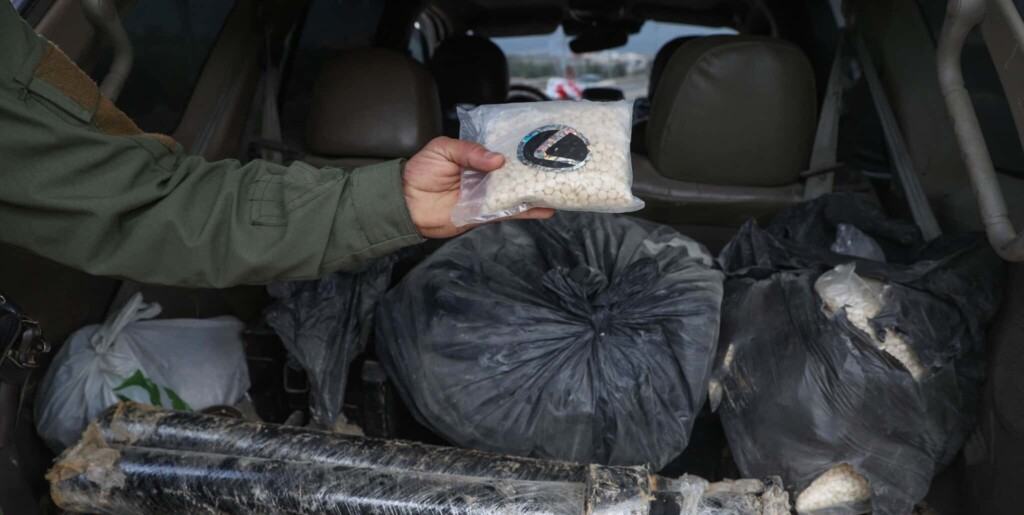
When Syrian President Ahmad al Sharaa entered Damascus in December 2024 as a victorious rebel, he remarked that Syria was “the world’s leading source of captagon” but “is being purified by the grace of God almighty.” However, despite Sharaa’s words, the captagon industry continues to operate.
An easy-to-produce amphetamine-based drug, captagon provided an economic lifeline to the former Bashar al Assad regime in Syria. The industry generated billions of dollars for Damascus and fell directly under the control of Assad and his close associates, most notably Maher al Assad—Bashar’s brother and the commander of the Syrian Arab Army’s 4th Division.
In the weeks after Assad’s fall, the new Syrian government, led by Sharaa, vigorously attacked the remnants of the deposed dictator’s narcotics empire, burning millions of captagon pills and uncovering dozens of narcotics factories across Syria.
In January, Sharaa negotiated the formation of a joint committee with Jordan to combat arms and drug smuggling along the countries’ shared 375-kilometer border. In a press conference regarding the committee, Syrian Foreign Minister Asaad Hassan al Shibani avowed, “When it comes to captagon and drug smuggling, we promise it is over and won’t return.” Early operations on the Jordanian border saw Syrian government forces discover 15 captagon factories, in addition to dozens of arms caches destined for Hezbollah in Israel and Lebanon.
However, subsequent efforts to curb the production and trafficking of the drug have proven lackluster. On March 16, Iraqi security forces seized more than seven million pills inside a truck that originated in Syria and passed through Turkey before arriving at the Iraqi border. The 1.1-ton seizure was the first since Assad’s ouster and one of the largest in Iraq in recent years.
In April, Syrian officials confiscated four million pills at the port of Latakia that were hidden inside metal bars, packaged, and ready to export. During the Assad era, captagon smugglers hid pills in a variety of products, from fake fruits to electronics, and the Syrian Arab Army’s 4th Division used the Latakia port to export the drug as far away as Malaysia. Despite Sharaa’s promise to “put an end” to Syria’s captagon industry, traffickers continue to operate by the same methods used under the Assad regime.
So far in May, there have already been three major captagon seizures. On May 5, the Lebanese army seized a truck near the border town of Hermel laden with equipment and chemicals to produce synthetic amphetamines. This seizure led to the discovery of a “large quantity” of captagon and a narcotics laboratory, which Lebanese authorities subsequently dismantled.
Ten days later, nine million pills were confiscated in Aleppo after a month-long joint effort between Syrian and Turkish officials. According to the Syrian Interior Ministry Telegram account, “Approximately 5 million of these pills were smuggled into Turkey, while the remaining quantity was intended for smuggling [to other countries].”
Most recently, on May 19, Syrian authorities seized four million pills hidden inside of tahini manufacturing equipment at the port of Latakia, marking the second mass seizure of captagon at the port this year.
Though some 30 million pills have been seized so far in 2025, arrests have been made on a case-by-case basis, mostly targeting low-level smugglers. As of May, no major production or trafficking networks have been dismantled except for those previously abandoned by the Assad regime. In addition, because industrial-level labs in northern Syria have been deserted, experts warn that small-scale captagon production might increase in the near future to meet demand in the Gulf States.
Despite Damascus’s can-do rhetoric and border security efforts, Sharaa’s government is still responding to the effects of the captagon trade rather than tackling the causes. Although security officials continue to seize shipments of the drug, its production continues. One reason for this could be that major drug kingpins in the Assad era have been welcomed into the new government. For instance, the week he entered Damascus, Sharaa met with local armed faction leaders to discuss their integration into the new Syrian army. Present was Imad Abu-Zureiq, an influential captagon kingpin who the US government sanctioned in 2023 for using his militia to “sell contraband, operate protection rackets, and smuggle drugs in Jordan, while also recruiting directly for [Syrian military intelligence.]”
Not long after that engagement, Sharaa and his newly appointed minister of defense, Murhaf Abu Qasra, took meetings and brokered deals with other narco-leaders, including Moayad al Aqra and Ali al Miqdad, who was later appointed head of military intelligence.
Despite Sharaa’s stated conviction to combat the Syrian narco-trade, the industry has proven it can flourish with or without the support of the state. Thus far, the new regime has underdelivered on its promise to “put an end” to captagon trafficking, and it remains to be seen whether authorities will make meaningful progress in curbing it.
